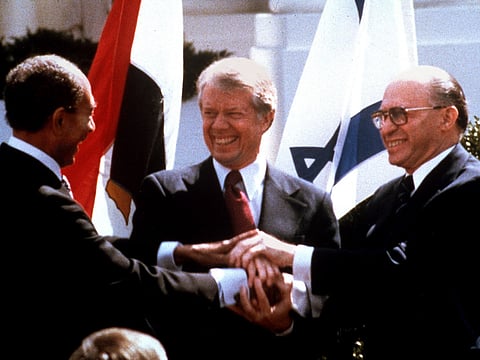Lessons from the Arab-Israeli 1973 war
Sadat’s surprise military operation was undermined by a failure of strategic thinking

All wars are fundamentally acts of deception, wrote Sun Tzu in his 15th century classical work The Art of War. And former Egyptian president Anwar Sadat astutely put this maxim to good use. He promised that 1972 would be the “Year of Decision”. It turned out to be the “Year of Deception”.
Throughout 1972, there were countless military manoeuvres that turned out to be just that: Manoeuvres that destabilised the enemy and sowed confusion among the political leadership. Sadat’s plan to liberate the Sinai, occupied by Israel since 1967, consisted of launching a surprise military operation on a Jewish holy day, since Israeli soldiers and reservists would likely be at home, observing the occasion. Only Sadat, Syrian president Hafez Al Assad and a small group of trusted advisers knew the date and time of the campaign.
But to maintain Sadat’s approach and preserve the element of surprise, it had been moved up at the last minute. Scheduled to begin at 1800 hrs, the time of the initiative was changed to 1400 hrs.
One more person is alleged to have had first-hand knowledge about the secret plan: Jamal Abdul Nasser’s son-in-law, Ashraf Marawan, who is described by the Israelis as the perfect double agent. In his capacity as director of Nasser’s office, Marawan had access to highly classified information that he reportedly sold to the Mossad (Israeli secret service) for $50,000-$100,000 (Dh183,900-Dh367,800) per meeting in order to support his extravagant lifestyle and business ventures.
Because the Israeli secret service had such faith in Marawan, they waited to hear from him despite what their own intelligence was reporting. They chose to ignore the Egyptian and Syrian troops amassing on the borders of the Occupied Territories. Despite warnings from their own reconnaissance, Israel assumed it was just routine military manoeuvres.
Finally, word came from Marawan. The attack was imminent and would take place that evening at 1800 hrs. Israel called up the reservists and mobilised, but it was too late. The attack occurred four hours earlier. Still, Marawan’s warning had saved Israel from almost certain destruction.
Egyptian troops were able to break through Israeli defences in the Sinai, cross the Suez Canal, and restore faith in the Egyptian army; which had been so badly damaged in the 1967 War. During the fighting, Al Assad went to Cairo and implored Sadat to open a second front in the Golan Heights, in order to alleviate the burden the Syrians were facing at a heavy cost. But Sadat remained unresponsive to Al Assad’s pleas.
Sadat proudly announced in parliament that as he spoke, the Egyptian soldiers had successfully crossed the Suez Canal.
As for the second war-objective — to wait for the superpowers to intervene and stop the war — it proved problematic. The nature of support that Washington provided to Israel was unconditional and played into the hands of the master of deceit, Henry Kissinger, the then US secretary of state, who secretly gave the green light to the Israelis to violate the ceasefire and international law. Meanwhile, support for Egypt from Moscow came with attached conditions. Sadat understood this reality and was convinced that Washington would never allow the Jewish state to be militarily defeated. Hence, the modesty of his war objectives — reopening the Suez Canal and reviving the interest of the superpowers in the peace process.
These objectives brought him into conflict with his Joint chief-of-staff, Saad Eldeen Al Shazly. The latter disagreed with Sadat over the conduct of the war and advocated for the continuation of the offensive rather than a withdrawal from the Sinai.
He reluctantly accepted the post of Egypt’s ambassador to the United Kingdom. A few years later, he publicly criticised Sadat’s initiative to sign a peace treaty with Israel and was court-marshalled and forced to leave his ambassador’s post and seek political refugee status in Algeria.
Al Shazly finally returned to Egypt after Sadat’s assassination, but faced a prison sentence.
Without a doubt, history has vindicated Al Shazly’s perspicacity and strategic thinking.
Adel Safty is distinguished visiting professor and special adviser to the rector at the Siberian Academy of Public Administration, Russia. His book, Might Over Right, is endorsed by Noam Chomsky and published in England by Garnet, 2009.



